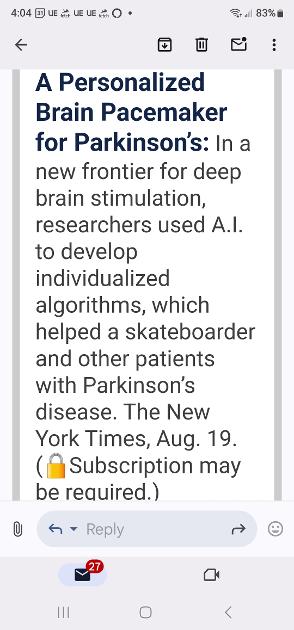I'm sorry I don't have the link. I don't have a subscription to NYT.
Brain Pacemaker for Parkinsons - Cure Parkinson's
Brain Pacemaker for Parkinsons

I think they are talking about personalizing the DBS here.
"A Personalized Brain Pacemaker for Parkinson’s
In a new frontier for deep brain stimulation, researchers used A.I. to develop individualized algorithms, which helped a skateboarder and other patients with Parkinson’s disease."
"When Shawn Connolly was diagnosed with Parkinson’s disease nine years ago, he was a 39-year-old daredevil on a skateboard, flipping and leaping from walls, benches and dumpsters through the streets of San Francisco. He appeared in videos and magazines, and had sponsorships from skateboard makers and shops.
But gradually, he began to notice that “things weren’t really working right” with his body. He found that his right hand was cupping, and he began cradling his arm to hold it in place. His balance and alignment started to seem off."
...............................
"A couple of years ago, Mr. Connolly volunteered for an experiment that summoned his daring and determination in a different way. He became a participant in a study exploring an innovative approach to deep brain stimulation.
In the study, which was published Monday in the journal Nature Medicine, researchers transformed deep brain stimulation — an established treatment for Parkinson’s — into a personalized therapy that tailored the amount of electrical stimulation to each patient’s individual symptoms.
The researchers found that for Mr. Connolly and the three other participants, the individualized approach, called adaptive deep brain stimulation, cut in half the time they experienced their most bothersome symptom."
more details on this:
ninds.nih.gov/news-events/n...
"aDBS improved each participant’s most bothersome symptom roughly 50% compared to conventional DBS. Notably, even though they were not told which type of treatment they were receiving at any one time, three of the four participants were often able to correctly guess when they were on aDBS due to noticeable symptom improvement.
This project is a continuation of several years of work led by Philip Starr, M.D., Ph.D., and colleagues at the University of California, San Francisco. Previously, in 2018, they reported the development of an adaptive DBS system, referred to as a “closed loop” system, that adjusted based on feedback from the brain itself. Later, in 2021, they described their ability to record brain activity in people as they went about their daily lives."
I wonder why England aways seems to be lacking in breakthrough trials ! For us living with next to no real constructive help .
if anyone wants to read the original article, I can post a a gift link.
here you go. nytimes.com/2024/08/19/heal...
This is good news
Here is the Gemini synopsis :
In a groundbreaking study published in Nature Medicine, researchers have successfully used AI to personalize deep brain stimulation, a treatment for Parkinson's disease. The study found that this individualized approach, called adaptive deep brain stimulation, significantly reduced the time patients experienced their most bothersome symptom, and in most cases, improved their quality of life. This breakthrough represents a major step forward in using brain implants and artificial intelligence to develop personalized treatments for neurological and psychiatric disorders.
How it Works:
system reads brain signals from two areas and adjusts the electrical stimulation based on the patient's symptoms.
It delivers more stimulation during periods of stiffness and less during periods of involuntary movement.
The algorithm is personalized for each patient, focusing on their most bothersome symptom.
Study Results:
The study involved four men with Parkinson's disease.
Adaptive stimulation cut in half the time they experienced their worst symptom.
Most patients reported improved quality of life in areas like mobility, pain, and ability to do usual activities.
Future Implications:
This study suggests that personalized brain stimulation is the future of treatment for neurological disorders.
While more research is needed, experts predict that some versions of brain pacemakers could be available within 5-10 years.
Key Takeaways:
AI-driven personalized deep brain stimulation has shown promising results in improving the lives of Parkinson's patients.
This breakthrough opens the door to developing similar personalized treatments for other neurological and psychiatric disorders.
Further research is needed to refine the technology and make it more accessible.